备考2011高效学习方案英语高二册:unit 7 living with disease
文档属性
| 名称 | 备考2011高效学习方案英语高二册:unit 7 living with disease |
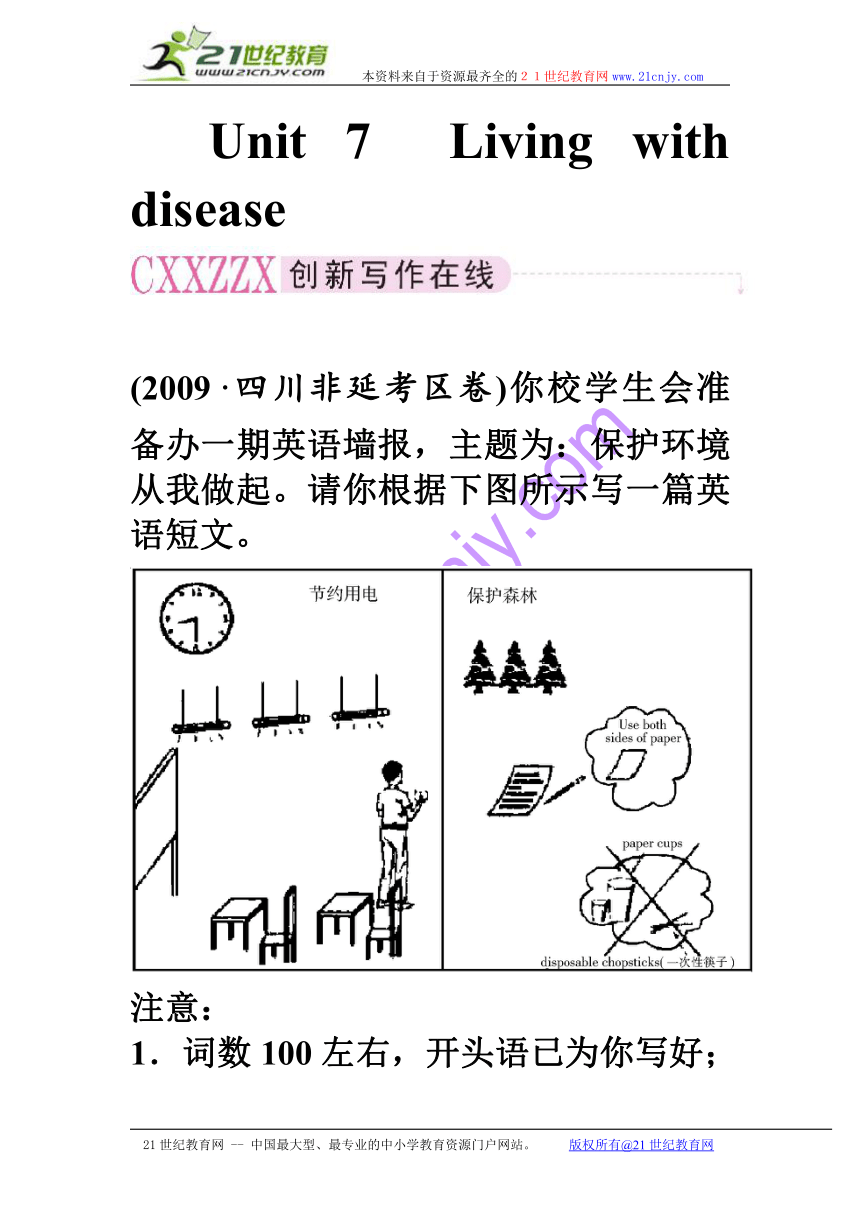
|
|
| 格式 | rar | ||
| 文件大小 | 205.0KB | ||
| 资源类型 | 教案 | ||
| 版本资源 | 人教版 | ||
| 科目 | 英语 | ||
| 更新时间 | 2010-12-14 00:00:00 | ||
图片预览

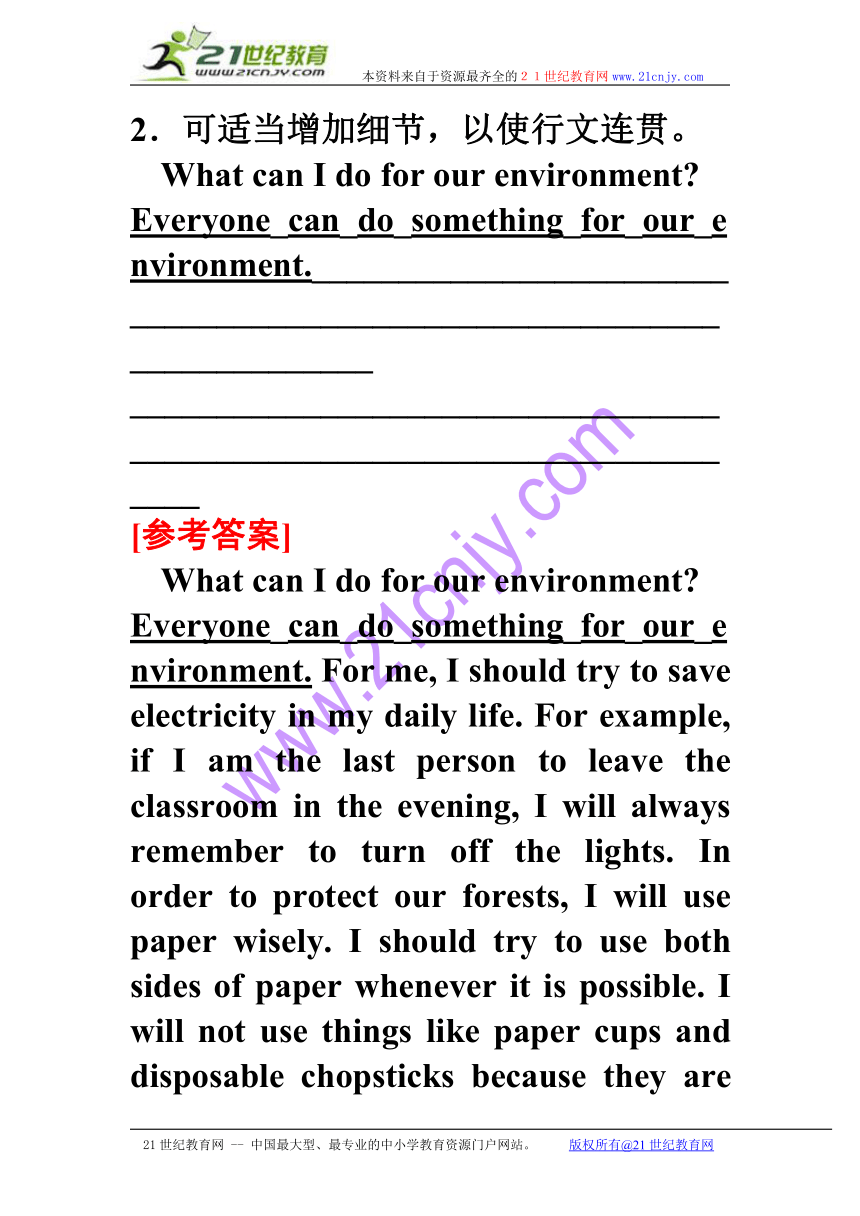
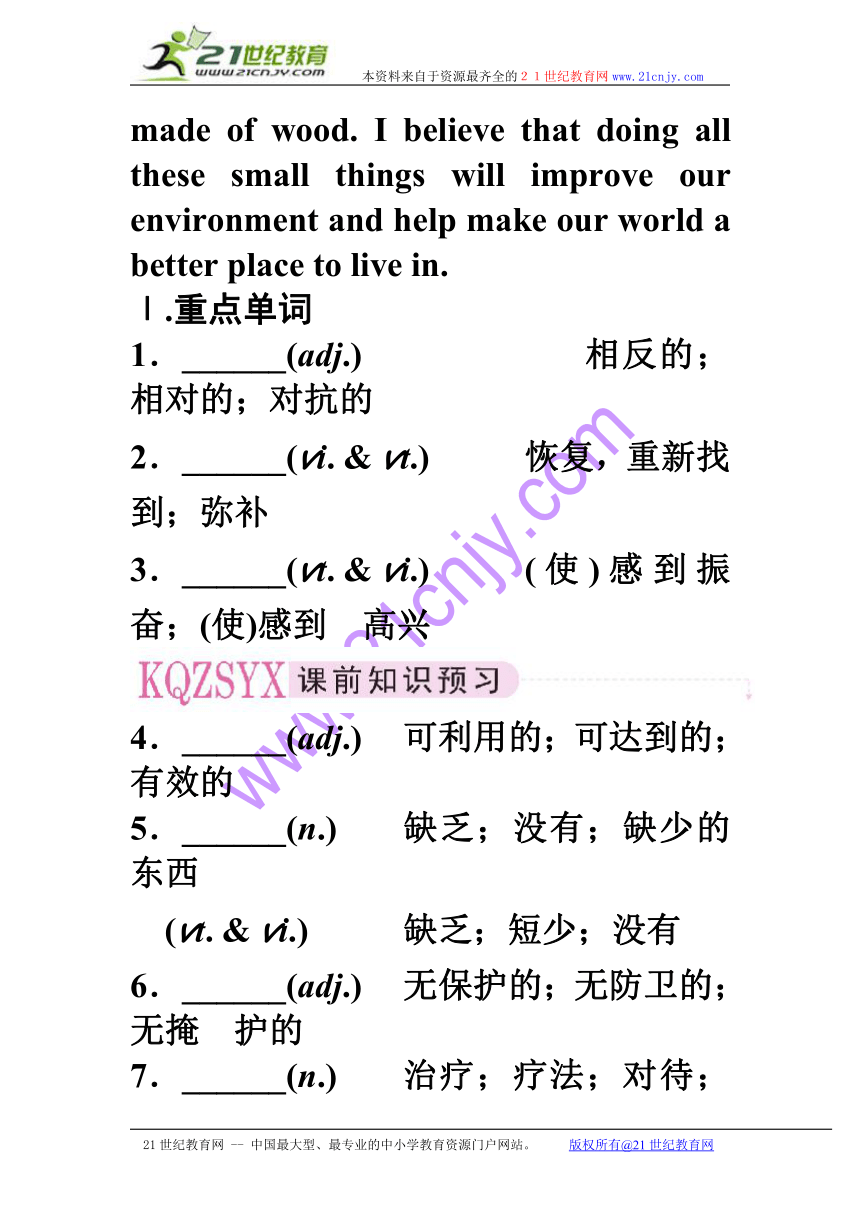
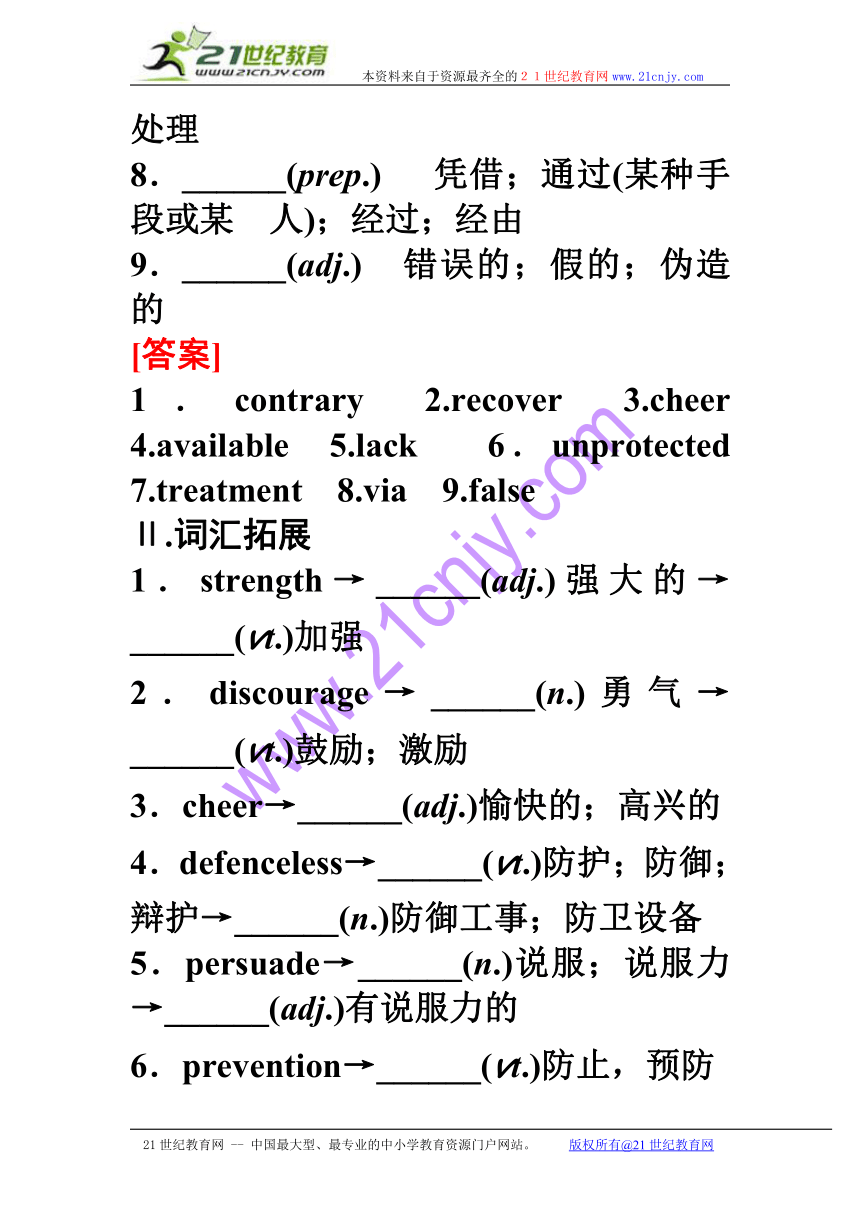
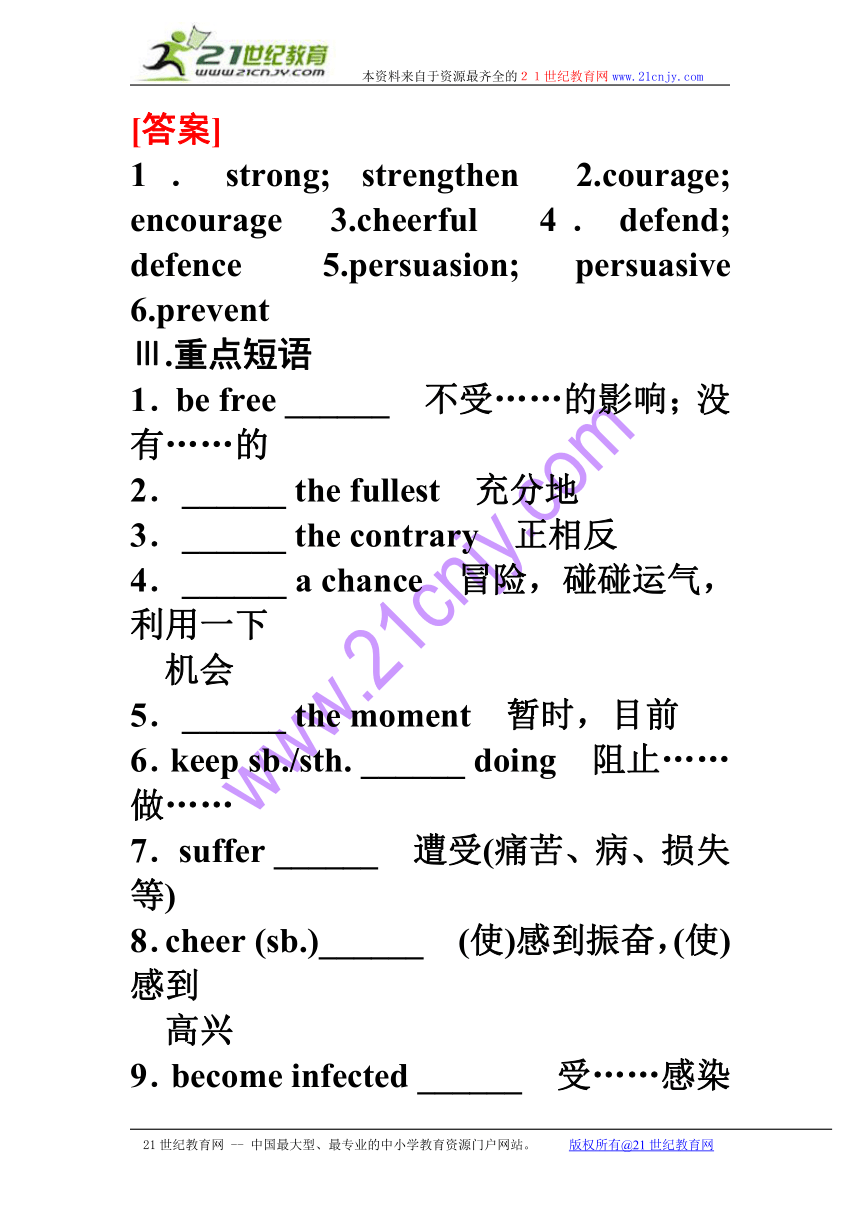
文档简介
本资料来自于资源最齐全的21世纪教育网www.21cnjy.com
Unit 7 Living with disease
(2009·四川非延考区卷)你校学生会准备办一期英语墙报,主题为:保护环境从我做起。请你根据下图所示写一篇英语短文。
注意:
1.词数100左右,开头语已为你写好;
2.可适当增加细节,以使行文连贯。
What can I do for our environment
Everyone_can_do_something_for_our_environment.________________________________________________________________________
________________________________________________________________________
[参考答案]
What can I do for our environment
Everyone_can_do_something_for_our_environment. For me, I should try to save electricity in my daily life. For example, if I am the last person to leave the classroom in the evening, I will always remember to turn off the lights. In order to protect our forests, I will use paper wisely. I should try to use both sides of paper whenever it is possible. I will not use things like paper cups and disposable chopsticks because they are made of wood. I believe that doing all these small things will improve our environment and help make our world a better place to live in.
Ⅰ.重点单词
1.______(adj.) 相反的;相对的;对抗的
2.______(vi. & vt.) 恢复,重新找到;弥补
3.______(vt. & vi.) (使)感到振奋;(使)感到 高兴
4.______(adj.) 可利用的;可达到的;有效的
5.______(n.) 缺乏;没有;缺少的东西
(vt. & vi.) 缺乏;短少;没有
6.______(adj.) 无保护的;无防卫的;无掩 护的
7.______(n.) 治疗;疗法;对待;处理
8.______(prep.) 凭借;通过(某种手段或某 人);经过;经由
9.______(adj.) 错误的;假的;伪造的
[答案]
1.contrary 2.recover 3.cheer 4.available 5.lack 6.unprotected 7.treatment 8.via 9.false
Ⅱ.词汇拓展
1.strength→______(adj.)强大的→______(vt.)加强
2.discourage→______(n.)勇气→______(vt.)鼓励;激励
3.cheer→______(adj.)愉快的;高兴的
4.defenceless→______(vt.)防护;防御;辩护→______(n.)防御工事;防卫设备
5.persuade→______(n.)说服;说服力→______(adj.)有说服力的
6.prevention→______(vt.)防止,预防
[答案]
1.strong; strengthen 2.courage; encourage 3.cheerful 4.defend; defence 5.persuasion; persuasive 6.prevent
Ⅲ.重点短语
1.be free ______ 不受……的影响;没有……的
2.______ the fullest 充分地
3.______ the contrary 正相反
4.______ a chance 冒险,碰碰运气,利用一下
机会
5.______ the moment 暂时,目前
6.keep sb./sth. ______ doing 阻止……做……
7.suffer ______ 遭受(痛苦、病、损失等)
8.cheer (sb.)______ (使)感到振奋,(使)感到
高兴
9.become infected ______ 受……感染的
10.______ sb./sth.+adj. 使……处于某种状态
11.break ______ 毁掉;垮掉;分解
12.live ______ 忍受;与……住在一起
[答案]
1.from 2.to 3.on 4.take 5.for 6.from
7.from 8.up 9.with 10.leave 11.down
12.with
Ⅳ.重点句型
1.I wish I could remember more about my mum.
我希望能记得母亲更多的情况。
2.I wish people would find out the facts...and not act as if I were a bad or dangerous person.
我希望人们了解实情,……不要把我当作坏人或危险人物。
Ⅴ.重点语法
The Subjunctive Mood 1(虚拟语气1)
Ⅰ.词汇聚焦
1.persuade v. 说服,劝说
[思维拓展]
persuade sb. to do sth.说服某人做某事
=persuade sb. into doing sth.
persuade sb. not to do sth.说服某人不做某事
=persuade sb. out of doing sth.
persuade sb. that使某人相信
=persuade sb. of sth.
[指点迷津]
如果说不服,劝不服,则用如下结构:
try to persuade sb. to do sth./into doing sth.
advise sb. to do sth.
①I persuaded him of its truth.
②He was persuaded to give up smoking.
③I have never persuaded him into taking others’ advice.
Alice trusts you; only you can ______ her to give up the foolish idea.
A. suggest B. attract
C. tempt D. persuade
解析:根据trust“相信;信任”可知,“只有你可以劝服她放弃那么愚蠢的想法。”故用D。
答案:D
They didn’t agree with us at first, but in the end we ______ them into carrying out the plan.
A. persuaded
B. tried to persuade
C. succeeded to persuade
D. advised
解析:句子中but表示前后意义转折,隐含着他们同意我们的意见。所以空格处表达“成功劝服”,排除B、D两项;succeed后接in doing,不接不定式。
答案:A
2.lack v. & n. 缺乏,短缺
[思维拓展]
for lack of因缺乏……
have no lack of不缺乏……
lack for nothing一无所缺
be lacking in在……缺乏
lack money/courage缺钱/缺乏勇气
be short of缺乏,缺少
run short of sth.把……用尽
sth. run short……不足,短缺
①She showed a lack of humour.
②He completely lacked conscience.
Though ______ money, his parents managed to send him to university.
A. lacked B. lacking of
C. lacking D. lacked in
解析:lack意为“缺乏”,是及物动词,though是连词。前半句意为“虽然缺钱”,作后半句的状语,故lack用现在分词形式。
答案:C
That was another example of ______ experience.
A. a lack with B. lack from
C. their lack for D. their lack of
解析:“缺乏……”应为lack sth.或lack of sth.,前者为及物动词,后者为名词。
答案:D
3.strength n. 体力,气力
[指点迷津]
strength, force, power与energy
strength着重指人的“体力”。
force指物理学意义上的“力”,也指为做某事而使用的力量,还可指武力。
power指能力、权力,着重行动所根据的能力、本领或职权。
energy指生理上的“精力”,物理学定义中的“能,能量”。
①He’s a man of great energy.
②Don’t use force on your friend.
③Knowledge is power.
To regain their ______ after an exhausting game, the players lay in the grass.
A. force B. energy
C. power D. health
解析:本题考查名词辨析,依据题意“在激烈的比赛之后,为了恢复能量,运动员们躺在草坪上。”可知应该用energy。
答案:B
4.recover v. 从……中痊愈;恢复
[思维拓展]
recover one’s sight恢复视力
recover from a cold感冒痊愈
recover oneself恢复健康
recover one’s strength恢复体力
recover health恢复健康
recover consciousness恢复意识
①He recovered from his illness.
②Has the country recovered from the effect of the war yet
She forgot her dialogue, but she soon ______ and went on with her lecture.
A. recovered herself B. returned to normal
C. lived through D. returned
解析:由题意知空格处表示“恢复常态”。
答案:A
5.suffer v. 受苦,遭受(病痛,损害等),忍受,忍耐
[思维拓展]
suffer for因某事而受罚
suffer from遭受……,患……
[注]suffer作为及物动词时,意为“遭受,忍受”(常用于否定句、疑问句)。
①The injured man was still suffering.
②His health suffered terribly for heavy drinking.
______ such heavy pollution already, it may now be too late to clean up the river.
A. Having suffered B. Suffering
C. To suffer D. Suffered
解析:本题考查分词短语作状语。分词作状语,其逻辑主语须是句子的主语,而本句的主语看似是it,其实它是形式主语,真正主语是不定式,而不定式前应视为省略了其逻辑主语for people。这样一来就清楚了,应用现在分词,再根据already的提示,应用完成时态。
答案:A
6.chance n. & v. 机会,机遇;可能性;碰巧
[思维拓展]
by chance=by accident偶然
by any chance万一
have a chance to do...有机会做……
=have a chance of doing...
have no chance to do...没有机会做……
=have no chance of doing...
chance to do...=happen to do...碰巧做……
It (so) chanced/happened that...碰巧……
take a chance冒险试一试
chance on/upon偶然找到
on the chance of指望着
①I’ve been waiting for the chance to speak to her.
②She could have been given a chance to be a manager.
There is ______ that the sick child will get well.
A. chance B. a chance
C. possible D. a possibility
解析:There is应该接名词,排除C;D项,去掉a;chance“机会,可能性”,可数名词用于句型There is a chance to do/of doing, There is a chance that...(同位语从句)。
答案:B
7.contrary n. 相反,对立面,反面;adj. 完全相反的,对抗的
①They say he’s guilty, but I believe the contrary.
②—I hear you’re enjoying your new job.
—On the contrary, I find it rather dull.
③Contrary to all our advice, he gave up his job.
[指点迷津]
on the contrary, on the other hand与in contrast
on the contrary用来表示完全不赞成别人刚刚说过的事。
on the other hand用来表示同一方面不同的事实。
in contrast则表示两个很不相同的事实之间惊人的差异。
①It rarely rains in the desert, but on the other hand it rains a lot in the coastal areas.
②It is hot in the desert in the day, but in contrast it’s very cold at night.
—You seem to show interest in cooking.
—What ______, I’m getting rid of it.
A. On the contrary B. To the contrary
C. On the other hand D. To the other hand
解析:四个选项的介词短语所表示的意思不同:A项“相反地”;B项“和这相反地”;C项“另一方面”;D项“到另一方面”。答语所陈述的是与第一个对话者所说的相反的情况。
答案:A
Ⅱ.短语突破
1.live with与……一起生活,忍受
[思维拓展]
live by靠……为生
live on以……为主食;继续活着
live through经历过,经……后还活着
live for为……而活着
live off依赖……生活
live up to遵守,不辜负
live one’s dream实现梦想
①I don’t enjoy the situation, but I can live with it.
②He lived through two world wars.
2.first of all首先
[思维拓展]
in all(=altogether)总共,全部
at all根本,全然(多用于否定句中,加强语气)
after all毕竟(表让步)
all in all总而言之
all over到处
all around/round在周围,到处
all through完全
all right没关系,可以;健康的;令人满意的
[指点迷津]
first of all首先,第一(表事物的排列顺序)
at first(=in/at the beginning)开始,起初(表某一事物的开头,常与but连用,前后有对比的含义)
above all首先(强调重要性)
[注]三个词组很容易混淆,但只要记住前两个词组中有first(与顺序、时间有关)就不难记住它们之间的区别了。
Children need many things, but ______ they need love.
A. after all B. at all
C. at first D. above all
解析:句意为:孩子们需要很多东西,但最重要的是爱。
答案:D
3.for the moment暂时
[思维拓展]
for a moment一会儿
not for a moment一刻也不;绝不
a moment ago刚才
at any moment随时,立刻
at the moment此刻,现在
at the last moment在最后一刻,刚刚赶上
have one’s moments也有走红/得意的时刻
the moment (that)...一……就……
①For the moment we are content to watch and wait.
②I’m busy at the moment, but I’ll do it later.
______ would I suggest that you do it carelessly.
A. For a moment B. For the moment
C. At the moment D. Not for a moment
解析:因题干用了倒装结构,所以只有D项符合要求。全句意为:“我绝不会建议你粗心大意地做这件事。”
答案:D
4.free from不受……影响的
The old lady is never free from/of pain.
Keep the surface free from dirt by putting a cover over it.
[思维拓展]
get/give sth. for free免费得到/赠送
free of charge免费
be free to do自由地做,随意地做
be free of没有……的,摆脱……的
set free释放
be free with对……大方,随便
of one’s own free will出于自愿
a smoke-free room/area无烟室/区
All the products bought from this company will be repaired ______ within three years.
A. freely B. for free
C. of free D. free of money
解析:句意是“所有从这家公司购买的产品三年内免费维修”。repair sth. for free表示“免费”,还可以用free, free of charge。freely意思是“自由自在地”。
答案:B
These tickets are ______. The film company gave them away to us ______.
A. for free; free B. free; freely
C. free; for free D. for free; free of charge
解析:表达“免费”在are后作表语,只能用形容词free,作状语可以用free, for free, free of charge。
答案:C
Ⅲ.句型归纳
1.I wish I could remember more about my mum,...我希望能记得母亲更多的事情……
wish后面的宾语从句用了could,是虚拟语气,表示不能实现的愿望。
[思维拓展]
①表示现在不能实现的愿望,从句谓语动词用过去式(be常用were)。
②表示将来不能实现的愿望,从句谓语动词用“would/could+动词原形”。
③表示过去不能实现的愿望,从句谓语动词用had done或could/would have done。
[指点迷津]
wish与hope
两者后都可接动词不定式;hope后接宾语从句要用陈述语气;wish后可接复合宾语,其宾语补足语是不定式/形容词/过去分词/副词,而hope则不可接复合结构;wish后可接双宾语,hope则不可。
wish用作名词时,其后可接不定式,也可接for引导的短语,但不能是“for doing”形式。
wish用作名词,作“祝愿,祝福”讲时,常用复数形式。
①I wish it were spring all the year round.
②I wish you could go shopping with me next Sunday.
③We wish we had arrived in Beijing two hours earlier.
④I wish I were young forever.
How I wish every family ______ a large house with a beautiful garden.
A. has B. had
C. will have D. had had
解析:wish后跟的宾语从句是表示对现在的一种愿望,故用一般过去时,选B。
答案:B
2.For some, medicine can help keep them alive...对有些病人来说,药物可以帮助他们维持生命……
[思维拓展]
keep+sb./sth.+adj. 使……保持……
keep+sb./sth.+doing使……一直处于……
keep a record保持记录
keep back阻止
keep fit保持健康
keep...in mind把……记在心中
keep in touch with与……保持联系
keep on doing继续做……
keep...out of不使……入内
keep up with赶上
[指点迷津]
①keep doing和keep on doing两个短语都有“重复”和“继续”之意,用法基本相同,但相对而言,keep on doing指有间断地继续做,在语气上强一些,强调决心和毅力;keep doing指无间断地做,不含感彩。
②“阻止某人做”可以使用:keep sb. from doing; stop sb. from doing; prevent sb. from doing。“被阻止做”则使用:be kept/stopped/prevented from doing,其中keep主动结构与被动结构中的from不可省略。
—Mummy, can I put the peaches in the cupboard
—No, dear. They don’t ______ well. Put them in the fridge instead.
A. keep B. fit
C. get D. last
解析:根据句子中两个地点名词cupboard和fridge可以推知谈话内容是把桃子保存好,所以使用keep表达“保留,保存”之意。fit的意思是“安装”;get的意思是“得到”;last的意思是“持续”,要与表时间的词语连用。
答案:A
His funny jokes ______ laughing all through the meal.
A. kept us B. kept on us
C. kept us from D. kept
解析:句意是“他有趣的笑话让我们在整个吃饭的过程中笑个不停”。keep sb. doing的意思是“让某人不间断地做某事”;keep on后接doing,但不接sb. doing; keep sb. from doing的意思是“阻止某人做某事”;keep doing的意思是“不断地做”,但此时主语是his funny jokes,与题意不符。
答案:A
3.I don’t think it is a good decision that...我认为……不是一个好的决定。
think后接宾语从句时,如具有否定意思且主语为第一人称,则习惯上否定主句中的think而不是否定宾语从句的谓语,这就是“否定的转移”。
[指点迷津]
类似这种用法的动词还有suppose, expect, imagine, believe等。另外,以上句子变反意疑问句时,反问在宾语从句上,且用肯定形式,但如果主句的主语不是第一人称时,则反问在主句上。
①I don’t think he will come today, will he
②You don’t think he will come today, do you
当提问think后的宾语从句中的某一成分,变特殊疑问句时,往往把主句变为一般疑问句,从句语序不变。如:
③I think the_new_words are useful.
→What do you think are useful
④I think he has managed to prevent an_accident.
→What do you think he has managed to prevent
[注]I don’t think...我想不会……。
I thought..我本来以为……。
I had thought...我原先认为……。
Who would have thought...谁会想到……?
[思维拓展]
①I think/believe/suppose/imagine/expect+宾语从句
②I don’t think/believe/suppose/imagine/expect+宾语从句
③疑问词+do you think/believe/suppose/imagine...
④反意疑问句:
I think he is honest, isn’t he
I don’t think he is honest, is he
但:He thinks we should go climbing, doesn’t he
⑤I think/believe/suppose/imagine/expect so.
⑥I don’t think/believe/suppose/imagine/expect so.
=I think/believe/suppose/imagine/expect not.
但:I hope so/not.
I’m afraid so/not.
I guess so/not.
I don’t suppose anyone will volunteer, ______?
A. do I B. don’t I
C. will they D. won’t they
解析:在否定转移的句型中,因为是否定句,故变反意疑问句时,用肯定形式,且同宾语从句的主语一致。
答案:C
4.Medical studies show that the AIDS virus cannot be transmitted via the following routes: 医学研究表明艾滋病毒不能通过下列途径传播:
via prep. 经由,由……途径
We went to London via Siberia.
He sent me a love letter via one of my friends.
5.I can become infected with HIV by swimming in a pool, holding hands or kissing someone with HIV.与艾滋病毒携带者在游泳池里游泳、握手、亲吻我会感染艾滋病毒。
by prep.靠,用,通过,表示方法、手段或所用的工具,后面可以接动名词作宾语。
[指点迷津]
by, with与in
by通常表示方法或手段,也可以接动名词表示某种手段;
with表示使用具体的工具;
in表示所用的原料、材料或途径。
①The street is lighted by electricity.
②She saw a strange bird with her own eyes.
③I filled in an application form in ink.
④I paid the bill in cash.
Apples are usually sold by ______ weight, and eggs are sometimes sold by ______ dozen.
A. the; the B. /; a
C. /; the D. the; a
解析:by weight固定搭配,意为“按重量,以斤两计”;但表示具体的计量单位前应加the。
答案:C
Luckily, the bullet narrowly missed the captain ______ an inch.
A. by B. at
C. to D. from
解析:此题考查固定搭配by an inch,句意为“幸运的是,仅差一英寸,子弹险些击中上尉”。
答案:A
21世纪教育网 -- 中国最大型、最专业的中小学教育资源门户网站。 版权所有@21世纪教育网
Unit 7 Living with disease
(2009·四川非延考区卷)你校学生会准备办一期英语墙报,主题为:保护环境从我做起。请你根据下图所示写一篇英语短文。
注意:
1.词数100左右,开头语已为你写好;
2.可适当增加细节,以使行文连贯。
What can I do for our environment
Everyone_can_do_something_for_our_environment.________________________________________________________________________
________________________________________________________________________
[参考答案]
What can I do for our environment
Everyone_can_do_something_for_our_environment. For me, I should try to save electricity in my daily life. For example, if I am the last person to leave the classroom in the evening, I will always remember to turn off the lights. In order to protect our forests, I will use paper wisely. I should try to use both sides of paper whenever it is possible. I will not use things like paper cups and disposable chopsticks because they are made of wood. I believe that doing all these small things will improve our environment and help make our world a better place to live in.
Ⅰ.重点单词
1.______(adj.) 相反的;相对的;对抗的
2.______(vi. & vt.) 恢复,重新找到;弥补
3.______(vt. & vi.) (使)感到振奋;(使)感到 高兴
4.______(adj.) 可利用的;可达到的;有效的
5.______(n.) 缺乏;没有;缺少的东西
(vt. & vi.) 缺乏;短少;没有
6.______(adj.) 无保护的;无防卫的;无掩 护的
7.______(n.) 治疗;疗法;对待;处理
8.______(prep.) 凭借;通过(某种手段或某 人);经过;经由
9.______(adj.) 错误的;假的;伪造的
[答案]
1.contrary 2.recover 3.cheer 4.available 5.lack 6.unprotected 7.treatment 8.via 9.false
Ⅱ.词汇拓展
1.strength→______(adj.)强大的→______(vt.)加强
2.discourage→______(n.)勇气→______(vt.)鼓励;激励
3.cheer→______(adj.)愉快的;高兴的
4.defenceless→______(vt.)防护;防御;辩护→______(n.)防御工事;防卫设备
5.persuade→______(n.)说服;说服力→______(adj.)有说服力的
6.prevention→______(vt.)防止,预防
[答案]
1.strong; strengthen 2.courage; encourage 3.cheerful 4.defend; defence 5.persuasion; persuasive 6.prevent
Ⅲ.重点短语
1.be free ______ 不受……的影响;没有……的
2.______ the fullest 充分地
3.______ the contrary 正相反
4.______ a chance 冒险,碰碰运气,利用一下
机会
5.______ the moment 暂时,目前
6.keep sb./sth. ______ doing 阻止……做……
7.suffer ______ 遭受(痛苦、病、损失等)
8.cheer (sb.)______ (使)感到振奋,(使)感到
高兴
9.become infected ______ 受……感染的
10.______ sb./sth.+adj. 使……处于某种状态
11.break ______ 毁掉;垮掉;分解
12.live ______ 忍受;与……住在一起
[答案]
1.from 2.to 3.on 4.take 5.for 6.from
7.from 8.up 9.with 10.leave 11.down
12.with
Ⅳ.重点句型
1.I wish I could remember more about my mum.
我希望能记得母亲更多的情况。
2.I wish people would find out the facts...and not act as if I were a bad or dangerous person.
我希望人们了解实情,……不要把我当作坏人或危险人物。
Ⅴ.重点语法
The Subjunctive Mood 1(虚拟语气1)
Ⅰ.词汇聚焦
1.persuade v. 说服,劝说
[思维拓展]
persuade sb. to do sth.说服某人做某事
=persuade sb. into doing sth.
persuade sb. not to do sth.说服某人不做某事
=persuade sb. out of doing sth.
persuade sb. that使某人相信
=persuade sb. of sth.
[指点迷津]
如果说不服,劝不服,则用如下结构:
try to persuade sb. to do sth./into doing sth.
advise sb. to do sth.
①I persuaded him of its truth.
②He was persuaded to give up smoking.
③I have never persuaded him into taking others’ advice.
Alice trusts you; only you can ______ her to give up the foolish idea.
A. suggest B. attract
C. tempt D. persuade
解析:根据trust“相信;信任”可知,“只有你可以劝服她放弃那么愚蠢的想法。”故用D。
答案:D
They didn’t agree with us at first, but in the end we ______ them into carrying out the plan.
A. persuaded
B. tried to persuade
C. succeeded to persuade
D. advised
解析:句子中but表示前后意义转折,隐含着他们同意我们的意见。所以空格处表达“成功劝服”,排除B、D两项;succeed后接in doing,不接不定式。
答案:A
2.lack v. & n. 缺乏,短缺
[思维拓展]
for lack of因缺乏……
have no lack of不缺乏……
lack for nothing一无所缺
be lacking in在……缺乏
lack money/courage缺钱/缺乏勇气
be short of缺乏,缺少
run short of sth.把……用尽
sth. run short……不足,短缺
①She showed a lack of humour.
②He completely lacked conscience.
Though ______ money, his parents managed to send him to university.
A. lacked B. lacking of
C. lacking D. lacked in
解析:lack意为“缺乏”,是及物动词,though是连词。前半句意为“虽然缺钱”,作后半句的状语,故lack用现在分词形式。
答案:C
That was another example of ______ experience.
A. a lack with B. lack from
C. their lack for D. their lack of
解析:“缺乏……”应为lack sth.或lack of sth.,前者为及物动词,后者为名词。
答案:D
3.strength n. 体力,气力
[指点迷津]
strength, force, power与energy
strength着重指人的“体力”。
force指物理学意义上的“力”,也指为做某事而使用的力量,还可指武力。
power指能力、权力,着重行动所根据的能力、本领或职权。
energy指生理上的“精力”,物理学定义中的“能,能量”。
①He’s a man of great energy.
②Don’t use force on your friend.
③Knowledge is power.
To regain their ______ after an exhausting game, the players lay in the grass.
A. force B. energy
C. power D. health
解析:本题考查名词辨析,依据题意“在激烈的比赛之后,为了恢复能量,运动员们躺在草坪上。”可知应该用energy。
答案:B
4.recover v. 从……中痊愈;恢复
[思维拓展]
recover one’s sight恢复视力
recover from a cold感冒痊愈
recover oneself恢复健康
recover one’s strength恢复体力
recover health恢复健康
recover consciousness恢复意识
①He recovered from his illness.
②Has the country recovered from the effect of the war yet
She forgot her dialogue, but she soon ______ and went on with her lecture.
A. recovered herself B. returned to normal
C. lived through D. returned
解析:由题意知空格处表示“恢复常态”。
答案:A
5.suffer v. 受苦,遭受(病痛,损害等),忍受,忍耐
[思维拓展]
suffer for因某事而受罚
suffer from遭受……,患……
[注]suffer作为及物动词时,意为“遭受,忍受”(常用于否定句、疑问句)。
①The injured man was still suffering.
②His health suffered terribly for heavy drinking.
______ such heavy pollution already, it may now be too late to clean up the river.
A. Having suffered B. Suffering
C. To suffer D. Suffered
解析:本题考查分词短语作状语。分词作状语,其逻辑主语须是句子的主语,而本句的主语看似是it,其实它是形式主语,真正主语是不定式,而不定式前应视为省略了其逻辑主语for people。这样一来就清楚了,应用现在分词,再根据already的提示,应用完成时态。
答案:A
6.chance n. & v. 机会,机遇;可能性;碰巧
[思维拓展]
by chance=by accident偶然
by any chance万一
have a chance to do...有机会做……
=have a chance of doing...
have no chance to do...没有机会做……
=have no chance of doing...
chance to do...=happen to do...碰巧做……
It (so) chanced/happened that...碰巧……
take a chance冒险试一试
chance on/upon偶然找到
on the chance of指望着
①I’ve been waiting for the chance to speak to her.
②She could have been given a chance to be a manager.
There is ______ that the sick child will get well.
A. chance B. a chance
C. possible D. a possibility
解析:There is应该接名词,排除C;D项,去掉a;chance“机会,可能性”,可数名词用于句型There is a chance to do/of doing, There is a chance that...(同位语从句)。
答案:B
7.contrary n. 相反,对立面,反面;adj. 完全相反的,对抗的
①They say he’s guilty, but I believe the contrary.
②—I hear you’re enjoying your new job.
—On the contrary, I find it rather dull.
③Contrary to all our advice, he gave up his job.
[指点迷津]
on the contrary, on the other hand与in contrast
on the contrary用来表示完全不赞成别人刚刚说过的事。
on the other hand用来表示同一方面不同的事实。
in contrast则表示两个很不相同的事实之间惊人的差异。
①It rarely rains in the desert, but on the other hand it rains a lot in the coastal areas.
②It is hot in the desert in the day, but in contrast it’s very cold at night.
—You seem to show interest in cooking.
—What ______, I’m getting rid of it.
A. On the contrary B. To the contrary
C. On the other hand D. To the other hand
解析:四个选项的介词短语所表示的意思不同:A项“相反地”;B项“和这相反地”;C项“另一方面”;D项“到另一方面”。答语所陈述的是与第一个对话者所说的相反的情况。
答案:A
Ⅱ.短语突破
1.live with与……一起生活,忍受
[思维拓展]
live by靠……为生
live on以……为主食;继续活着
live through经历过,经……后还活着
live for为……而活着
live off依赖……生活
live up to遵守,不辜负
live one’s dream实现梦想
①I don’t enjoy the situation, but I can live with it.
②He lived through two world wars.
2.first of all首先
[思维拓展]
in all(=altogether)总共,全部
at all根本,全然(多用于否定句中,加强语气)
after all毕竟(表让步)
all in all总而言之
all over到处
all around/round在周围,到处
all through完全
all right没关系,可以;健康的;令人满意的
[指点迷津]
first of all首先,第一(表事物的排列顺序)
at first(=in/at the beginning)开始,起初(表某一事物的开头,常与but连用,前后有对比的含义)
above all首先(强调重要性)
[注]三个词组很容易混淆,但只要记住前两个词组中有first(与顺序、时间有关)就不难记住它们之间的区别了。
Children need many things, but ______ they need love.
A. after all B. at all
C. at first D. above all
解析:句意为:孩子们需要很多东西,但最重要的是爱。
答案:D
3.for the moment暂时
[思维拓展]
for a moment一会儿
not for a moment一刻也不;绝不
a moment ago刚才
at any moment随时,立刻
at the moment此刻,现在
at the last moment在最后一刻,刚刚赶上
have one’s moments也有走红/得意的时刻
the moment (that)...一……就……
①For the moment we are content to watch and wait.
②I’m busy at the moment, but I’ll do it later.
______ would I suggest that you do it carelessly.
A. For a moment B. For the moment
C. At the moment D. Not for a moment
解析:因题干用了倒装结构,所以只有D项符合要求。全句意为:“我绝不会建议你粗心大意地做这件事。”
答案:D
4.free from不受……影响的
The old lady is never free from/of pain.
Keep the surface free from dirt by putting a cover over it.
[思维拓展]
get/give sth. for free免费得到/赠送
free of charge免费
be free to do自由地做,随意地做
be free of没有……的,摆脱……的
set free释放
be free with对……大方,随便
of one’s own free will出于自愿
a smoke-free room/area无烟室/区
All the products bought from this company will be repaired ______ within three years.
A. freely B. for free
C. of free D. free of money
解析:句意是“所有从这家公司购买的产品三年内免费维修”。repair sth. for free表示“免费”,还可以用free, free of charge。freely意思是“自由自在地”。
答案:B
These tickets are ______. The film company gave them away to us ______.
A. for free; free B. free; freely
C. free; for free D. for free; free of charge
解析:表达“免费”在are后作表语,只能用形容词free,作状语可以用free, for free, free of charge。
答案:C
Ⅲ.句型归纳
1.I wish I could remember more about my mum,...我希望能记得母亲更多的事情……
wish后面的宾语从句用了could,是虚拟语气,表示不能实现的愿望。
[思维拓展]
①表示现在不能实现的愿望,从句谓语动词用过去式(be常用were)。
②表示将来不能实现的愿望,从句谓语动词用“would/could+动词原形”。
③表示过去不能实现的愿望,从句谓语动词用had done或could/would have done。
[指点迷津]
wish与hope
两者后都可接动词不定式;hope后接宾语从句要用陈述语气;wish后可接复合宾语,其宾语补足语是不定式/形容词/过去分词/副词,而hope则不可接复合结构;wish后可接双宾语,hope则不可。
wish用作名词时,其后可接不定式,也可接for引导的短语,但不能是“for doing”形式。
wish用作名词,作“祝愿,祝福”讲时,常用复数形式。
①I wish it were spring all the year round.
②I wish you could go shopping with me next Sunday.
③We wish we had arrived in Beijing two hours earlier.
④I wish I were young forever.
How I wish every family ______ a large house with a beautiful garden.
A. has B. had
C. will have D. had had
解析:wish后跟的宾语从句是表示对现在的一种愿望,故用一般过去时,选B。
答案:B
2.For some, medicine can help keep them alive...对有些病人来说,药物可以帮助他们维持生命……
[思维拓展]
keep+sb./sth.+adj. 使……保持……
keep+sb./sth.+doing使……一直处于……
keep a record保持记录
keep back阻止
keep fit保持健康
keep...in mind把……记在心中
keep in touch with与……保持联系
keep on doing继续做……
keep...out of不使……入内
keep up with赶上
[指点迷津]
①keep doing和keep on doing两个短语都有“重复”和“继续”之意,用法基本相同,但相对而言,keep on doing指有间断地继续做,在语气上强一些,强调决心和毅力;keep doing指无间断地做,不含感彩。
②“阻止某人做”可以使用:keep sb. from doing; stop sb. from doing; prevent sb. from doing。“被阻止做”则使用:be kept/stopped/prevented from doing,其中keep主动结构与被动结构中的from不可省略。
—Mummy, can I put the peaches in the cupboard
—No, dear. They don’t ______ well. Put them in the fridge instead.
A. keep B. fit
C. get D. last
解析:根据句子中两个地点名词cupboard和fridge可以推知谈话内容是把桃子保存好,所以使用keep表达“保留,保存”之意。fit的意思是“安装”;get的意思是“得到”;last的意思是“持续”,要与表时间的词语连用。
答案:A
His funny jokes ______ laughing all through the meal.
A. kept us B. kept on us
C. kept us from D. kept
解析:句意是“他有趣的笑话让我们在整个吃饭的过程中笑个不停”。keep sb. doing的意思是“让某人不间断地做某事”;keep on后接doing,但不接sb. doing; keep sb. from doing的意思是“阻止某人做某事”;keep doing的意思是“不断地做”,但此时主语是his funny jokes,与题意不符。
答案:A
3.I don’t think it is a good decision that...我认为……不是一个好的决定。
think后接宾语从句时,如具有否定意思且主语为第一人称,则习惯上否定主句中的think而不是否定宾语从句的谓语,这就是“否定的转移”。
[指点迷津]
类似这种用法的动词还有suppose, expect, imagine, believe等。另外,以上句子变反意疑问句时,反问在宾语从句上,且用肯定形式,但如果主句的主语不是第一人称时,则反问在主句上。
①I don’t think he will come today, will he
②You don’t think he will come today, do you
当提问think后的宾语从句中的某一成分,变特殊疑问句时,往往把主句变为一般疑问句,从句语序不变。如:
③I think the_new_words are useful.
→What do you think are useful
④I think he has managed to prevent an_accident.
→What do you think he has managed to prevent
[注]I don’t think...我想不会……。
I thought..我本来以为……。
I had thought...我原先认为……。
Who would have thought...谁会想到……?
[思维拓展]
①I think/believe/suppose/imagine/expect+宾语从句
②I don’t think/believe/suppose/imagine/expect+宾语从句
③疑问词+do you think/believe/suppose/imagine...
④反意疑问句:
I think he is honest, isn’t he
I don’t think he is honest, is he
但:He thinks we should go climbing, doesn’t he
⑤I think/believe/suppose/imagine/expect so.
⑥I don’t think/believe/suppose/imagine/expect so.
=I think/believe/suppose/imagine/expect not.
但:I hope so/not.
I’m afraid so/not.
I guess so/not.
I don’t suppose anyone will volunteer, ______?
A. do I B. don’t I
C. will they D. won’t they
解析:在否定转移的句型中,因为是否定句,故变反意疑问句时,用肯定形式,且同宾语从句的主语一致。
答案:C
4.Medical studies show that the AIDS virus cannot be transmitted via the following routes: 医学研究表明艾滋病毒不能通过下列途径传播:
via prep. 经由,由……途径
We went to London via Siberia.
He sent me a love letter via one of my friends.
5.I can become infected with HIV by swimming in a pool, holding hands or kissing someone with HIV.与艾滋病毒携带者在游泳池里游泳、握手、亲吻我会感染艾滋病毒。
by prep.靠,用,通过,表示方法、手段或所用的工具,后面可以接动名词作宾语。
[指点迷津]
by, with与in
by通常表示方法或手段,也可以接动名词表示某种手段;
with表示使用具体的工具;
in表示所用的原料、材料或途径。
①The street is lighted by electricity.
②She saw a strange bird with her own eyes.
③I filled in an application form in ink.
④I paid the bill in cash.
Apples are usually sold by ______ weight, and eggs are sometimes sold by ______ dozen.
A. the; the B. /; a
C. /; the D. the; a
解析:by weight固定搭配,意为“按重量,以斤两计”;但表示具体的计量单位前应加the。
答案:C
Luckily, the bullet narrowly missed the captain ______ an inch.
A. by B. at
C. to D. from
解析:此题考查固定搭配by an inch,句意为“幸运的是,仅差一英寸,子弹险些击中上尉”。
答案:A
21世纪教育网 -- 中国最大型、最专业的中小学教育资源门户网站。 版权所有@21世纪教育网
同课章节目录
